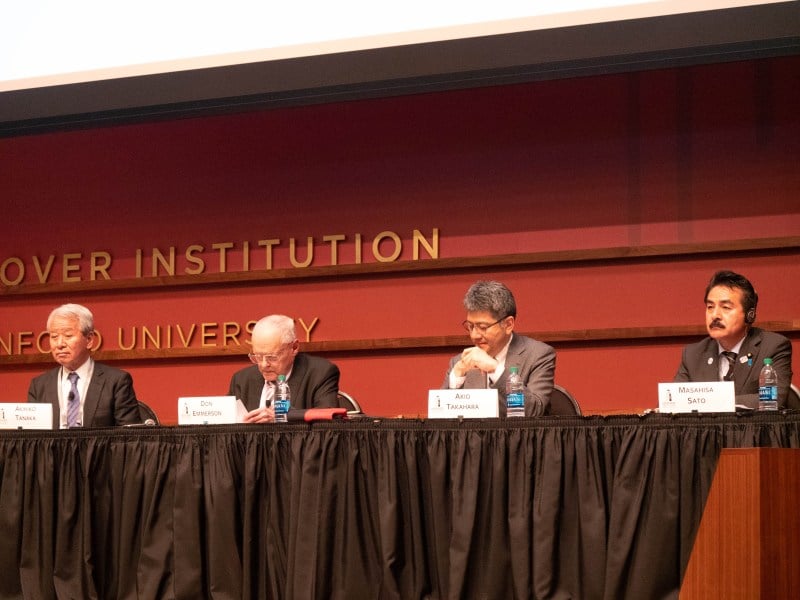On Thursday, the third Asia-Pacific Geo-Economic Strategy Forum (APGEO) saw discussion on issues of international strategic cooperation in the Asia-Pacific with a particular focus on the U.S.-Japan relationship. Speakers included experts on defense and foreign affairs, including former U.S. National Security Advisor H.R. McMaster and former Japanese Ministers of Defense.
Organized by the Hoover Institution, Nikkei Inc. and the Freeman Spogli Institute of International Studies (FSI), the talks occurred within the context of the United State’s Free and Open Indo-Pacific Strategy (FOIP) and Japan’s Medium Term Defense Program, both recently updated to outline the U.S. and Japan’s respective regional commitments.
The forum’s speakers focused on the rise of China as a common theme underscoring the importance of the U.S.-Japan alliance. Particularly, the speakers shared a general consensus that China’s attempts to increase its economic and political influence and its initiatives to drive progress on technological frontiers such as 5G networks and artificial intelligence pose a threat to the current international order.
“The policies of the Chinese Communist Party pose a significant threat not only to the United States but to all free and open societies and to the liberal international order,” McMaster said.
According to McMaster, strengthening the U.S.-Japan alliance through security and technological cooperation and through promoting confidence in “free and open systems” is crucial to managing relations with China.
In discussing the Belt and Road Initiative (BRI), a strategy by China to invest and build infrastructure in nations where it hopes to conduct trade, University of Tokyo Graduate School of Public Policy Dean Akio Takahara noted the need for Japan to strengthen its guard against China while simultaneously reaping the benefits of economic interaction. He likened the BRI to a constellation, saying that projects ought to be judged on their individual feasibility and merit as opposed to subscribing wholesale to a nebulous image.
“The Chinese are pointing at the sky and saying, ‘You see all those stars? You can see a dragon there’ — that’s the Belt and Road Initiative,” Takahara said. “But in reality there’s no constellation, there’s no dragon, but the stars are there, and they are tangible and we should be checking the stars — the projects — one by one.”
While Takahara spoke of the potential economic compatibility of the BRI with the FOIP, FSI senior fellow emeritus Don Emmerson noted the differing perspectives on FOIP among South-East Asian nations and their position within the struggle for regional influence between the U.S. and China. Particularly, he mentioned that the words “free and open” were often substituted for “inclusive and transparent” within the South-East Asian dialogue, a pragmatic nod to certain more authoritarian governments in the region.
In addition, Emmerson noted that “inclusivity” could also be interpreted as the expression of a desire not to be completely at the mercy of either the U.S. or China.
“[South-East Asian nations are] hedging against the Chinese, [and] they’re hedging against the Americans at the same time” he said. “On one hand, it’s a message to China to include the Americans, on the other hand, it’s a message to the Americans to include the Chinese.”
Emmerson further noted that two thirds of educated professionals surveyed in ten South-East Asian nations believed that Japan would “do the right thing” internationally, while significantly fewer expressed similar confidence in China or the U.S.
Need for increased Japan-U.S. bilateral cooperation in the defense industry was also discussed by a panel on cooperation in technology, trade and economics.
Former Acquisition, Technology and Logistics Agency commissioner Hideaki Watanabe spoke in Japanese on the benefits of the private sector’s increased participation in developing dual-purpose technologies for both civilian and security use. He also expressed his wish for more involvement of private Japanese corporations in the supply chains of the American military industry, citing the hope that government regulations could be revised for that purpose.
Northrop Grumman Aerospace Systems Corporate Vice President and President Janis Pamiljans agreed with Watanabe, particularly emphasizing the importance of cooperation in bringing about technological innovation.
“The regulations, government to government — we’ve got to work through those because innovation is what we want to unleash,” he said.
Carter Clelland ’21, an international relations major, attended the forum for information that would help prepare him for his internship at the Indo-Pacific Command this summer.
“I really liked the comparison of the Belt and Road Initiative to a constellation,” he said. “[It] seems to alleviate a lot of fear and show that it is what you make of it and that Westerners or other Asian nations can actually cooperate with China on the BRI to create a free and more open world.”
Contact Sean Chen at kxsean ‘at’ stanford.edu.
